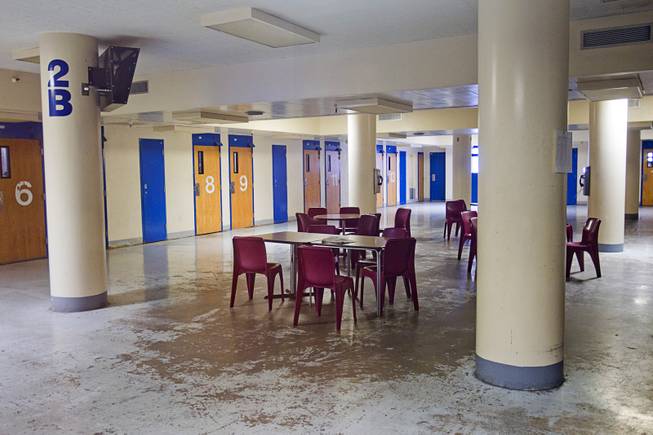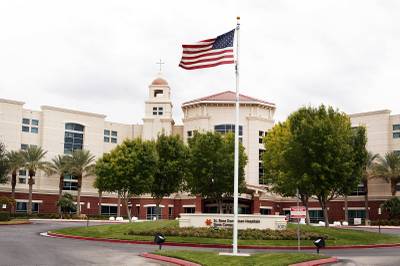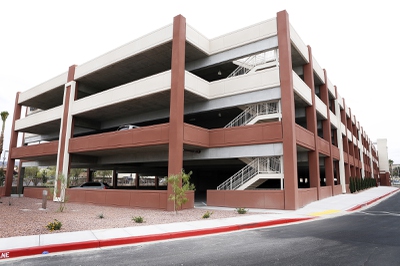
A housing area for mentally ill inmates is shown during a tour of the Clark County Detention Center Tuesday, July 23, 2013.
Sunday, Oct. 20, 2013 | 2 a.m.
Related stories
- Decay in Nevada’s mental health system goes beyond Rawson-Neal
- Nevada, targeted in ACLU’s patient-dumping suit, cites changes at psychiatric hospital
- Nevada’s mental health system to get $2.1-million funding infusion
- Feds: Rawson-Neal will lose funding if it fails inspection
- State OKs greater support for mental health programs
- Audit: Redesigning mental health treatment methods could save Nevada $14 million
- Feds cite failures in Rawson-Neal hospital’s patient-discharge procedures
- Rawson-Neal Psychiatric Hospital still faces hurdles, including federal review
- Independent review finds nothing ‘inappropriate’ at Rawson-Neal but details needed improvements
- Sandoval decries improper patient discharge from Vegas psychiatric hospital
- Man’s journey to California casts a pall on Nevada’s mental health system
- Lead plaintiff in patient-dumping lawsuit to governor: ‘We’re not supposed to be treated that way ’
Missy McLean’s frantic pleas over the telephone went unheeded.
Some 2,200 miles away in Toronto, Canada, she could do nothing as doctors at a Las Vegas hospital discharged her mentally ill brother onto the streets of Las Vegas.
“The doctor said they could get him a bus ticket to get him to the airport,” she said. “I asked if somebody could accompany him to the airport since he was alone and not well. She (the doctor) said, ‘No, we don’t do that.’”
Her brother, a 29-year-old tourist whose bipolar disorder had flared up during a vacation to Las Vegas over Labor Day weekend, had gone missing, spent a stint in jail and rested for several days in Valley Hospital.
But his story was just beginning.
“I said to the nurse that my brother is not well enough to be released, and he is alone down there and has nowhere to go and has very little money,” McLean said of her brother, whose name she asked not be used for fear that publication of his mental illness would affect his employment and relationships. “I knew he was not in the right state of mind to navigate himself to the airport.
"He doesn’t know the city.”
Still, hospital staff deemed him fit for discharge. He walked out the door, presumably just a bus ride away from McCarran International Airport and a plane flight away from home.
Responsible after discharge?
Hospitals aren’t legally responsible for what happens when somebody walks out their doors.
They must accept patients who may be mentally ill and “medically clear” them, a process by which medical staff determine a patient’s odd behavior isn’t the result of some physical malady.
But emergency rooms in Las Vegas hospitals have become holding cells for the mentally ill. In September, Las Vegas area hospitals had an average of 112 mental health patients sitting in emergency rooms that largely lack psychiatric wards or psychiatric staff. They’re waiting for transfer to the state’s Rawson-Neal Psychiatric Hospital, which almost always is full, or they wait to be released, where they are allowed to walk out the door into an uncertain and frequently treacherous future.
Such was the fate that befell McLean’s brother, who was deemed by medical staff not to require hospitalization in a facility like Rawson-Neal.
At that moment, when McLean’s brother walked out the door of Valley Hospital, he was on his own with nothing but his mania-driven mind to guide him.
Mental health officials call this moment an “intercept point," a moment at which somebody can swoop in and say, “Hey, buddy, let’s get you some help here.”
“Really, the discharge or the next step is an opportunity to prevent a future problem,” said Richard Whitley, administrator for the Nevada Division of Mental Health and Developmental Services.
But this sometimes doesn’t happen for vulnerable patients in Las Vegas, particularly when they’re discharged from an overcrowded emergency room.
“Nobody really owns the underlying issue,” Whitley said. “Clients are just shifted to the next intervention point.”
A fatal jump
For Larry Shaver Jr., 44, that shift proved fatal.
Metro Police picked up the construction worker from Alabama late in the evening of July 6 on Las Vegas Boulevard. He was breaking windows and seemed distraught and paranoid, sure that somebody was holding his family hostage in a nearby apartment.
A friend tried in vain to remind him that his family members were in Alabama.
Alert that Shaver may have a mental illness but without clinical expertise to know for sure, the police ordered him to a hospital. A private ambulance company took him to St. Rose Dominican Hospitals-Siena Campus in Henderson.
At the hospital, lab tests indicated Shaver had consumed alcohol and smoked tobacco and marijuana.
Shaver also told hospital staff he’d smoked methamphetamine, according to hospital reports.
Lying in bed, he appeared calm. Hospital documents noted “no sign of distress.” A nurse said that Shaver said, “I’m not going to kill myself.”
“I think his episode of confusion was from methamphetamine use,” reads a physician’s emergency room report on Shaver. “There is no evidence of psychosis, suicidal or homicidal ideation.”
But no psychiatrist or social worker talked to Shaver. Nobody called Southern Nevada Adult Mental Health Services, the state mental health agency.
The physician wrote that Shaver should go home and see a doctor in Henderson within a day or so if his condition worsened.
So on July 7, he walked out the door at 6:11 a.m.
His friend Kahele Derwin said he got a call from Shaver at 6:20 a.m. asking to be picked up from the hospital, according to police reports.
When he arrived, he found Shaver standing on top of the parking garage. Derwin told him to get down, don’t jump.
He looked away for a second and when he looked back, Shaver was falling.
Shaver fell 45 feet to his death.
The Clark County Coroner’s Office ruled his death a suicide last month, and the state health division determined that the hospital had followed all protocols and procedures.
“No regulatory deficiencies were identified,” the report states. “No further action is necessary.”
Hospital policy states that nobody needs to wait with patients to make sure they get picked up unless patients are under the influence of prescribed medication.
Legally, the hospital had washed its hands of Shaver.
When police picked him up the previous night, they set in motion a legal process called a “legal 2000” hold. That’s when they deem a person to be a threat to himself or others and place the person under involuntary medical watch.
But once that threat evaporates, the hospital has no reason to hold anybody, said Kate Grey, vice president of strategic marketing for St. Rose Dominican Hospitals.
Shaver was free to leave.
Coming off a cocktail of drugs, he missed his “intercept,” something as simple as a ride home to a safe place.
Instead, Shaver — father of three, brother to two siblings, son to his father and mother, and husband to his wife — fell to his death and was buried in Troy, Ala., on July 12.
Bipolar and missing on the Strip
Missy McLean would face similar circumstances a few months later.
She filed a missing persons report with Metro Police on Labor Day when it became clear that her brother was having a manic episode somewhere on the Strip.
“We searched, made phone calls and sort of were in this limbo of not knowing if he was alive or where he was or where he was going to turn up,” she said.
The police found her brother at 1:30 a.m. Tuesday on the Strip, where he was arrested for trespassing, the most common offense that lands mentally ill people in jail in Las Vegas.
While under observation at the Clark County Detention Center, employees noted his odd behavior.
They decided to put him on a legal 2000 hold.
“Because of his condition, we opted to get him further medical attention so he just didn’t leave our facility while he had an ongoing medical condition,” said Jose Hernandez, a Metro officer who reviewed McLean’s brother’s records for the Sun.
Police called a private ambulance company and ordered McLean’s brother to University Medical Center’s emergency room for further evaluation.
But when his sister went looking for him, she couldn’t find him at UMC. He wasn’t there.
She found him instead at Valley Medical Center, which is near UMC.
He stayed from Tuesday until Saturday.
She kept in touch with the rotating nurses. At one point, she asked if there was anybody overseeing her brother’s case.
“I asked the nurses if a social worker had seen my brother; she said that service is not available here anymore,” McLean said, noting that her brother’s care team in Canada had such services. “That person has been critical to ensure that he doesn’t fall through the cracks because he’s (the social worker) sort of the liaison between my brother and the outside world.”
A team of psychiatrists does visit local hospitals and advise emergency room staff about mental health patients, said Chelsea Szklany, state administrator at Southern Nevada Adult Mental Health Services.
But it’s unclear if any of those doctors saw McLean’s brother.
McLean asked if somebody should fly down to Las Vegas to retrieve her brother, but a doctor assured her he would be transferred to Rawson-Neal.
Then Saturday morning rolled around and a new doctor discharged her brother “home.”
“She just felt that, in her opinion as a medical professional, he was not in psychosis, that he was not in a manic state, that he was aware of what was going on,” McLean said of her conversation with hospital staff.
The Valley Health System declined to comment for this story, citing patient privacy laws.
McLean’s brother never made it to the airport to catch his flight home.
His family knew where he was because they tracked his spending on a debit card linked to his mother’s bank account.
“He was everywhere, up and down the Strip,” she said.
He didn’t sleep Saturday or Sunday night.
A Las Vegas resort might be “the absolute worst place” for a mentally ill man, McLean said.
“When they’re in a manic situation, you want as little stimulation as possible,” she said. “Vegas is the complete opposite. It is gambling, which they should avoid. It’s alcohol, which they should avoid. You can be up all night and find a place to go any time.”
But apart from tracking McLean’s brother through his spending, the family had no way to recover him.
“At that point we knew we couldn’t put any faith in the Vegas medical system to find him and help him,” McLean said. “We knew we’d have to go down there and find him.”
That weekend, a family friend flew to Las Vegas to try to find McLean’s brother. Her family members felt they were racing to beat the bad news; they didn’t want the next phone call to come from the coroner’s office.
“When they’re in manic episodes, they can be aggressive, they can be disruptive, they can be scary,” McLean said. “Is the police officer going to draw a weapon, or are they going to recognize mental illness and treat him that way?”
Police officers in Las Vegas now receive crisis intervention training, and when they found McLean’s brother, they recognized a health problem.
They called his mother, who linked him with the family friend, and the two flew back to Canada a week after he’d gone missing.
There, his medical care team met him at the airport and immediately readmitted him to a hospital.
He was discharged from a Canadian hospital Oct. 1 after spending 22 days in inpatient care.
No case managers
Looking back on the ordeal she called a “nightmare,” McLean said she wishes the private hospitals or state or county would hire case managers to guide people like her brother through the system.
“The correctional staff and medical staff are not there to advocate for them,” she said. “It’s not their job to look down the road and say, ‘Where is this person going to go when they leave here?’”
But the system allows hospitals to release these patients “to home,” whether that be a Las Vegas apartment, as was Shaver’s case, or to Canada, as was McLean’s case.
The system functioned as it was designed to function. But that doesn’t mean the system is well-designed.
Stuart Ghertner, a former director of Southern Nevada Adult Mental Services, said these cases are similar to recent “patient dumping” stories in which the Sacramento Bee detailed how patients at Rawson-Neal Psychiatric Hospital were discharged via Greyhound to cities throughout the United States.
These situations are “more and more of the same thing, only these are coming out of the private sector, not the state system,” he said.
He said that, as a rule, private hospitals don’t have psychiatric units, given that they produce little, if any, income. As a result, they tend to simply hold the patients until they can be transferred to Rawson-Neal. But in these cases, the patients lingered at the hospitals and “wound up being discharged without getting appropriate care,” Ghertner said.
Unlike most other states, local jurisdictions have no responsibility to care for the mentally ill or substance abusers. The Nevada Constitution mandates only that the state must run “institutions for the benefit of the insane.”
That leaves a single state hospital — 450 miles from the state capital — responsible for the mentally ill who live in Southern Nevada and visitors who are drawn to Las Vegas for its happy-go-lucky reputation.
Meanwhile, Las Vegas’ private emergency rooms, jails and prisons have become widely acknowledged as de facto mental health institutions in Nevada.
In the 1970s and ’80s, a time of nationwide, mass deinstitutionalization of the mentally ill, volunteers offered support and transportation for patients.
“Arrangements for taking discharged hospital clients to the bus terminal or airport were not difficult to arrange,” Jim Northrup, former director of Southern Nevada Adult Mental Health Services, wrote in an email to the Sun. “I recall taking several clients to the bus terminal myself; one to the airport, at various hours of the day and night. Many other staff also assisted in the 1970s-1990s.”
That volunteer program no longer exists because its coordinator was cut during budget shortfalls in the 1990s, he said.
After a series of high-profile news stories about Nevada’s decaying mental health system, Gov. Brian Sandoval and the Legislature directed additional funding aimed at keeping the mentally ill out of emergency rooms.
Nevada recently spent millions to open a drop-in center for the mentally ill and is now operating an urgent care center for the mentally ill in an effort to alleviate the pressure on private hospitals.
The state also has spent millions of dollars to reopen its old mental health hospital by mid-2015, the earliest time by which the Legislature can appropriate money to staff the hospital.
Most immediately, the urgent care center could alleviate the numbers of patients in local emergency rooms.
“We’re trying to provide alternate sites where you do not have to put somebody on a (legal 2000),” said Szklany, administrator at Southern Nevada Adult Mental Health Services. “About 60 percent of the people who are admitted on an L2K are discharged back out into the community because inpatient psychiatric care isn’t what they need.”





Join the Discussion:
Check this out for a full explanation of our conversion to the LiveFyre commenting system and instructions on how to sign up for an account.
Full comments policy